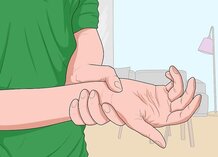 Multiple Sclerosis Multiple Sclerosis (MS) is a condition which affects the central nervous system, including the brain and spinal cord. MS is extremely variable affecting each person who has it in a different way. We don’t yet know the cause of MS, but it is thought to be an auto immune condition. Types of MS The course of MS is unpredictable. Some people are minimally affected by the disease while others have rapid progress to total disability with most people fitting between these two extremes. Although every individual will experience a different combination of MS symptoms, there are a number of distinct patterns relating to the course of the disease. Clinically Isolated Syndrome If a person has only had one episode or symptom they are generally diagnosed as having clinically-isolated syndrome (CIS). A person with CIS may or may not go on to develop clinically definite MS. Relapsing Remitting MS (RRMS) RRMS is the most common form of the disease. It is characterised by clearly defined acute attacks with either full recovery or with residual deficit upon recovery. Periods between disease relapses are characterised by a lack of disease progression. Approximately 85% of people with MS begin with a relapsing-remitting course. Secondary Progressive MS (SPMS) SPMS begins with an initial relapsing remitting disease course, followed by progression of a disability that may include occasional relapses and minor remissions and plateaus. Typically, secondary progressive disease is characterised by less recovery following attacks, persistently worsening function during and between attacks, and /or fewer and fewer attacks (or none at all) accompanied by progressive disability. According to some natural history studies, of the 85% who star with relapsing-remitting disease, more than 50% will develop SPMS within 10 years: with 90% within 25 years. More recent natural history studies (perhaps because of the use of MRI to assist in the diagnosis) suggest a more benign outlook that these numbers suggest. Primary Progressive MS (PPMS) PPMS is characterised by disability from onset, without plateaus or remissions or with occasional plateaus and temporary minor improvements. A person with PPMS, by definition, does not experience acute attacks. Of people with MS diagnosed, only 10% have PPMS. In addition, the diagnostic criteria for PPMS are less secure than those for RRMS so that often the diagnosis is only made long after the onset of neurological symptoms and at a time when the person is already living with significant disability. Progressive Relapsing MS (PRMS) PRMS, which is the least common disease course, shows progression of disability from onset but with clear acute relapses, with or without full recovery. Approximately 5% of people with MS appear to have PRMS at diagnosis. Not infrequently a patient may be initially diagnosed as having PPMS and then will experience an acute attack, thereby establishing the diagnosis of PRMS. It is believed that about 1 in 1000 New Zealanders have a diagnosis of PRMS. The MS and Parkinson’s Society run specialist exercise classes for people with MS, as well as monthly morning teas. MSNZ (http://ww.msnz.org.nz/) is a reliable online source of information about MS symptoms as well as for news and research updates. The Multiple Sclerosis a page on Health Navigator NZ (https://www.healthnavigator.org.nz/health-a-z/m/multiple sclerosis/) is also a good concise source of information. If you live in Canterbury and have recently been diagnosed with MS< or know someone who has and want to find out how you can support them, contact our office on (03) 366 2857 or email [email protected] If you need additional support to maintain your independence Therapy Professionals therapists can help, just contact us: Phone: 03 377 5280 Email: [email protected] Reference: Parkinsons (https://ms-pd.org.nz/parkinsons/) Comments are closed.
|
AuthorShonagh O'Hagan Archives
July 2024
|

 RSS Feed
RSS Feed